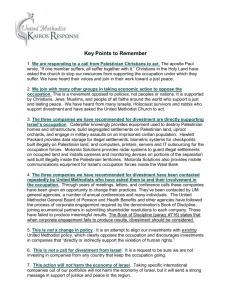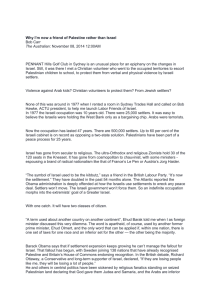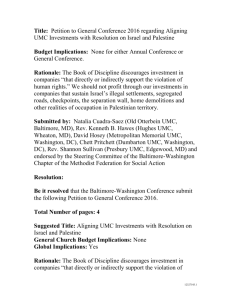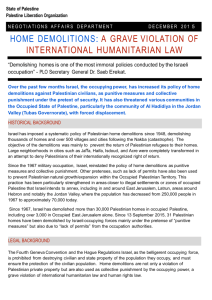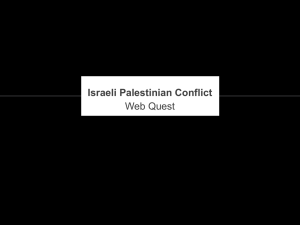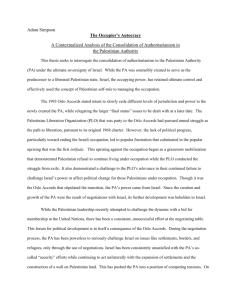World Council of Churches Central Committee
advertisement
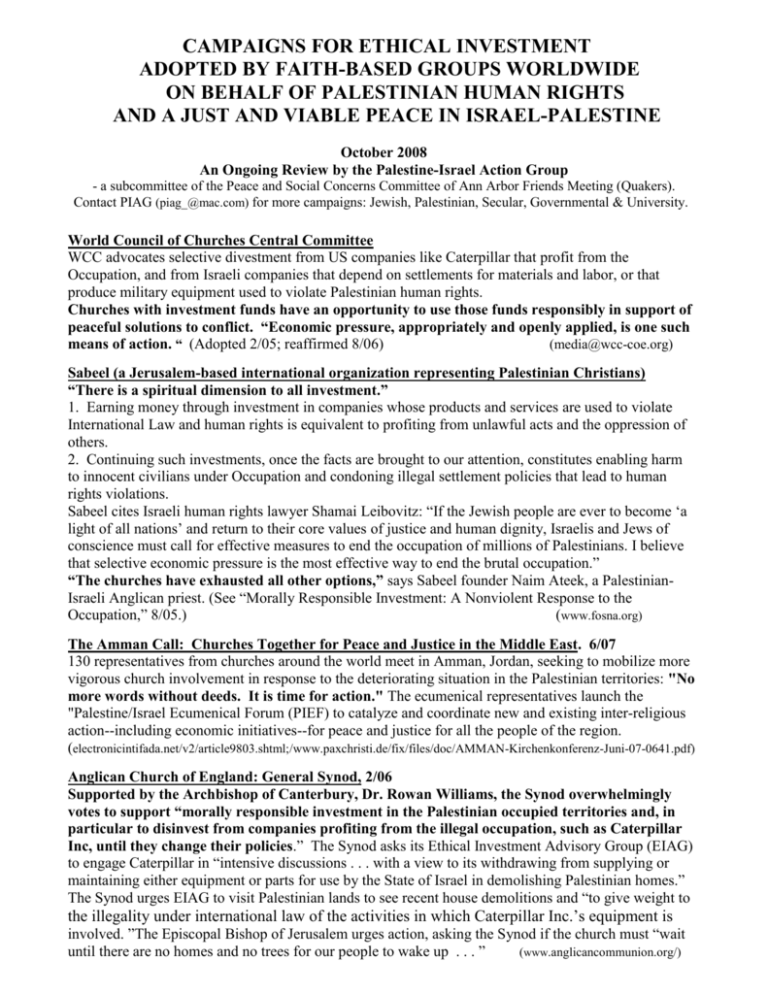
CAMPAIGNS FOR ETHICAL INVESTMENT ADOPTED BY FAITH-BASED GROUPS WORLDWIDE ON BEHALF OF PALESTINIAN HUMAN RIGHTS AND A JUST AND VIABLE PEACE IN ISRAEL-PALESTINE October 2008 An Ongoing Review by the Palestine-Israel Action Group - a subcommittee of the Peace and Social Concerns Committee of Ann Arbor Friends Meeting (Quakers). Contact PIAG (piag_@mac.com) for more campaigns: Jewish, Palestinian, Secular, Governmental & University. World Council of Churches Central Committee WCC advocates selective divestment from US companies like Caterpillar that profit from the Occupation, and from Israeli companies that depend on settlements for materials and labor, or that produce military equipment used to violate Palestinian human rights. Churches with investment funds have an opportunity to use those funds responsibly in support of peaceful solutions to conflict. “Economic pressure, appropriately and openly applied, is one such means of action. “ (Adopted 2/05; reaffirmed 8/06) (media@wcc-coe.org) Sabeel (a Jerusalem-based international organization representing Palestinian Christians) “There is a spiritual dimension to all investment.” 1. Earning money through investment in companies whose products and services are used to violate International Law and human rights is equivalent to profiting from unlawful acts and the oppression of others. 2. Continuing such investments, once the facts are brought to our attention, constitutes enabling harm to innocent civilians under Occupation and condoning illegal settlement policies that lead to human rights violations. Sabeel cites Israeli human rights lawyer Shamai Leibovitz: “If the Jewish people are ever to become ‘a light of all nations’ and return to their core values of justice and human dignity, Israelis and Jews of conscience must call for effective measures to end the occupation of millions of Palestinians. I believe that selective economic pressure is the most effective way to end the brutal occupation.” “The churches have exhausted all other options,” says Sabeel founder Naim Ateek, a PalestinianIsraeli Anglican priest. (See “Morally Responsible Investment: A Nonviolent Response to the Occupation,” 8/05.) (www.fosna.org) The Amman Call: Churches Together for Peace and Justice in the Middle East. 6/07 130 representatives from churches around the world meet in Amman, Jordan, seeking to mobilize more vigorous church involvement in response to the deteriorating situation in the Palestinian territories: "No more words without deeds. It is time for action." The ecumenical representatives launch the "Palestine/Israel Ecumenical Forum (PIEF) to catalyze and coordinate new and existing inter-religious action--including economic initiatives--for peace and justice for all the people of the region. (electronicintifada.net/v2/article9803.shtml;/www.paxchristi.de/fix/files/doc/AMMAN-Kirchenkonferenz-Juni-07-0641.pdf) Anglican Church of England: General Synod, 2/06 Supported by the Archbishop of Canterbury, Dr. Rowan Williams, the Synod overwhelmingly votes to support “morally responsible investment in the Palestinian occupied territories and, in particular to disinvest from companies profiting from the illegal occupation, such as Caterpillar Inc, until they change their policies.” The Synod asks its Ethical Investment Advisory Group (EIAG) to engage Caterpillar in “intensive discussions . . . with a view to its withdrawing from supplying or maintaining either equipment or parts for use by the State of Israel in demolishing Palestinian homes.” The Synod urges EIAG to visit Palestinian lands to see recent house demolitions and “to give weight to the illegality under international law of the activities in which Caterpillar Inc.’s equipment is involved. ”The Episcopal Bishop of Jerusalem urges action, asking the Synod if the church must “wait until there are no homes and no trees for our people to wake up . . . ” (www.anglicancommunion.org/) Anglican Church of England: Virginia Water Parish, Guildford Diocese. 10/06 The parish decides to implement the decision of the General Synod on its own. It withdraws its funds from its Church of England investment account in order to disinvest from companies such as Caterpillar that are profiting from Israel's occupation of Palestine. The Central Board of Finance (CBF), which manages investment funds, has so far declined to implement the General Synod's decision. "We are simply doing what the local Church in Palestine and the General Synod has asked us to do," says Vicar Stephen Sizer. "If the CBF will not withdraw our money from Caterpillar, then we will do it for them. We are looking for an investment fund with a more ethically sound policy." (info@imri.org.uk) Anglican Consultative Council. 5/05 Calls for “active engagement” by Anglican communions worldwide to wrestle with companies that support the occupation of Palestinian lands or violence against innocent Israelis. It encourages investment that supports the infrastructure of a future Palestinian State. (www.anglicancommunion.org/) Anglican Church of Kenya, 7/05 Joins in urging movement toward divestment from companies whose activities contribute to the occupation of Palestinian land or to violence against innocent Israelis. “You only have to go there and [you will] sympathize with the Palestinians, especially when it comes to the separation wall. . . and the mistreatment of the women and men at the roadblocks,” said Bishop Gideon Ireri, speaking after the Kenyan synod backed the 5/05 call of the Anglican Consultative Council. (www.episcopalchurch.org) Anglican Church of Canada, 11/05 The Council of General Synod unanimously passed a resolution asking the eco-justice committee, with the help of Kairos, a Canadian ecumenical justice group, to research the activities of companies believed to be contributing to violence in Israel and Palestine, as well as those contributing to peace and economic stability in that region. The committee, along with the Financial Management Development Investment Subcommittee, should “explore a range of socially responsible investment strategies, including corporate engagement and positive investment or divestment.” (anglicanjournal.com/132/01/canada15.html) Ecumenical Action Group: Investment for a Just Peace in Israel/Palestine This is a US-based group of investment advisors from several Christian denominations working for the investment of their churches' funds consistent with a just Israeli-Palestinian peace. They serve as an ecumenical resource, providing information and advice to interested church members who share this aim. (Bill.Somplatsky-Jarman@pcusa.org, S.Hoder<apassionforpeace@aol.com>) Ecumenical Campaign to End the Illegal Occupation of Palestine: Support a Just Peace in the Middle East. The campaign, begun in 2002, aims to mobilize member churches and ecumenical partners of the World Council of Churches through advocacy, prayer, building awareness of the issues and of churches' and secular groups' work in addressing the conflict, and accompaniment of Israelis and Palestinians engaging in nonviolent actions. The Campaign calls for a boycott of all products from Jewish settlements and an arms embargo until Israel withdraws from the Occupied Territories and complies with UN resolutions. (www.wcc-coe.org/wcc/what/international/palestine/campaign-home.html) Episcopalian Executive Council (US), 10/05 EEC directs its Committee for Social Responsibility in Investments to undertake the following: 1. Corporate engagement via dialogue and shareholder resolutions, as appropriate, to encourage companies to adopt socially responsible practices that advance positive changes in Israeli government policy and end the Occupation. 2. Urge the Palestinian Authority to oppose violence as a means of resistance. 3. “Positive investment” – encourage companies to invest in the economic infrastructure of the West Bank and Gaza: “A stable Palestinian state will make for a more secure Israel.” Seek 2 opportunities, with others, to make loans to “support economic justice and development in support of a future Palestinian State.” Palestine, like Israel, has a right to an economy that flourishes. 4. Urge members of the Church to visit church partners and others in Israel and the Palestinian Territories in order to understand the complexities of the conflict. (www.episcopalchurch.org/) Evangelical Lutheran Church of America (ELCA), 8/07 Evangelical Lutherans, with nearly 5 million US members, back "exploration of the feasibility of refusing to buy products produced in Israeli settlements" and of supporting the purchase of Palestinian products, in measures adopted by The Churchwide Assembly, the denomination's key legislative body. The Assembly calls for examination of the denomination's "entire investment activity," excluding divestiture. These economic initiatives are part of a decision to "recommit to the Churchwide Strategy for Engagement in Israel and Palestine through awareness-building, accompaniment [visits with Holy Land hosts], and advocacy." The initiative builds on the Peace Not Walls campaign the Assembly adopted in 2005, and will be undertaken in consultation with Evangelical Lutheran churches in Jordan and the Holy Land. (www.elca.org/news/Releases.asp?a=3718) Interfaith Council for Peace and Justice The Ann Arbor, Michigan interfaith group, in 5/03 adopts a resolution that recognizes the US government’s complicity in violations of human rights, and calls for suspending military aid and arms sales to Israel. It asks the University of Michigan, the city of Ann Arbor and members’ religious organizations to exert their influence, and, along with individuals, to divest from companies that sell arms or other military hardware to Israel. The goal is to bring about Israel’s compliance with UN resolutions and the Geneva Convention. (info@icpj.net) Interfaith Group for Morally Responsible Investment (IMRI)-UK This consortium sees “no prospect for peace without the intervention of the international community.” They support the decision of the Synod of the Anglican Church of England, 2/06, to commence disinvestment from companies that support the illegal occupation. IMRI asks individual Anglican parishes to shift their investment funds away from Caterpillar. IMRI members include concerned Anglicans, and the Amos Trust, Friends of Al Aqsa, Interpal, Jews for Justice for Palestinians, Just Peace-UK, the Palestinian Return Centre, and Pax Christi. (info@imriorg.uk; stephen.sizer@btinternet.com) Pax Christi: Catholic International Peace Movement. 7/06 Pax Christi announces support for a UK campaign aimed at multi-national companies that profit from the Occupation, including Volvo, Caterpillar, Daewoo and Sainsbury's. Australian Pax Christi convenor Fr. Claude Mostowik calls for the campaign to expand as a worldwide boycott. (cathnews.com/news/607/60.php) Presbyterian Church, USA. 6/08 The 2008 General Assembly continues working for peace in Israel-Palestine with actions that include direct economic engagement with companies supporting or profiting from the occupation of Palestine and/or other violence in the region. Representatives of the Committee on Mission Responsibility Through Investment (MRTI) reported to the GA that they are in the midst of "corporate engagement" with both Caterpillar and Motorola and believe they are making progress. MRTI aims to persuade corporations to change their practices through correspondence, direct talks, proxy voting, shareholder resolutions, and, if need-be, through a recommendation for divestment. The Presbyterians also voted to endorse the World Council of Churches affirmation of a "two-state" solution, a shared Jerusalem, and human rights of refugees and occupied peoples. They asked that the World Council's call be included in future church study documents, along with information about the church's historic concern for justice and peace in Israel-Palestine, and interpretation of matters such as actions of the Mission Responsibility Through Investment Committee. The Assembly called on the 3 church to be a voice for victims of violence in Israel and in Palestine and it condemned all acts of violence against innocent civilians. These new resolutions build on measures adopted in 2006 urging that the church’s investments “as they pertain to Israel, Gaza, East Jerusalem, and the West Bank, be invested in only peaceful pursuits.” The 2006 resolution further asked MRTI to ”identify affirmative investment opportunities as they pertain to Israel, Gaza, East Jerusalem, and the West Bank" and to work for the “creation of a socially, economically, geographically, and politically viable and secure Palestinian state, alongside an equally viable and secure Israeli state, both of which have a right to exist.” The 2006 GA supported “fair criticism” of the wall, saying: “To the extent that the security barrier violates Palestinian land . . . the barrier should be dismantled and relocated." (pcusa.org/worldwide/israelpalestine/resources/divestmentfaqpart2.pdf; I-P Mission Network: p.coffman@sbcglobal.net) Presbyterian Church of Scotland. 5/06 The General Assembly, meeting in Edinburgh, calls on European authorities and the World Council of Churches to clearly identify products from Israeli settlements in the West Bank “to enable consumers to make informed choices.” The General Assembly has no investments directly relevant to its concerns about Israel and the Palestinians. (ekklesia.co.uk/content/news_syndication/article_060524cofs.s) Religious Society of Friends (Quakers): American Friends Service Committee (AFSC). 3/08. AFSC is affiliated with the Religious Society of Friends (Quakers). The AFSC Board adopts an "investment screen" barring investments in companies that provide products or services (including financial services) used by Israeli governmental or military bodies or Israeli or Palestinian organizations or groups "to facilitate or undertake violent acts against civilians or violations of international law." The screen would bar investment in companies that help maintain Israel's military occupation of Gaza and the West Bank, including East Jerusalem, or that help maintain and expand Israeli settlements or the Separation Wall. The Board states, "We take this action as a matter of conscience and an expression of our unwillingness to remain complicit with violence and oppression occurring daily in Palestine and Israel, which is contrary to all that we know to be true and right." <www.afsc.org/israelpalestine/default.htm> Religious Society of Friends (Quakers): Atlanta Meeting (Georgia), 7/06, and Olympia Meeting (Washington State). 8/06 “By using US-supplied weapons to attack Gaza and Lebanon, Israel is violating the terms of the US Arms Export Control Act and Foreign Assistance Act. The Arms Export Control Act restricts the use of US weapons to legitimate self-defense and internal policing; US weapons cannot be used to attack civilians in offensive operations. The Foreign Assistance Act prohibits US aid of any kind to a country that routinely kills civilians as a result of its military operations. … We urge the President and Congress to stop all foreign assistance and military equipment exports to Israel until it ceases military attacks outside of its internationally recognized borders.” (atlanta.quaker.org) (olyfriends.homestead.com) Roman Catholic: Mercy Investment Program, Sisters of Mercy, Maryknoll Sisters, Sisters of St. Francis of Philadelphia, Sisters of Loretto and Jewish Voice for Peace. 4/05 The Sisters’ Caterpillar shareholder resolution asked Cat to investigate whether its sale of bulldozers to Israel violates the company’s own code of conduct: “It is a matter of public record that since September 2000, the Israeli government has used Caterpillar equipment to destroy more than 3000 homes, hundreds of public buildings and private commercial properties and vast areas of agricultural land,” uprooting “hundreds of thousands of olive trees as well as orchards of dates, prunes, lemons and oranges causing widespread economic hardship and environmental degradation in rural areas of Palestine.” The resolution received a 3% vote at the shareholders’ meeting --“a remarkable success,” said JVP. The goal was "to put this issue front and center in the minds of the Caterpillar board.” 4 The 2005 effort built upon work of the Sisters of Loretto, who filed a shareholders resolution in 2004. A Sister addressed the shareholders meeting, telling CAT executives, “You understand the implications of improvement in clean emissions, equal employment opportunity, environmental impact of mining and logging. But with sales to the Israeli Army through the Department of Defense, you have stepped up Caterpillar's role in the public arena. Caterpillar bulldozers are tools of war now and Caterpillar is an arms dealer, sharing in responsibility for the horrendous use of those weapons.” The 2004 resolution won 4% of the shareholders’ votes. . (catdestroyshomes.org) (lorettocommunity.org) (sistersofmercy.org) (iccr.org/) Roman Catholic: National Coalition of American Nuns. 8/07 The coalition, founded in 1969 for individual nuns dedicated to issues of social justice and human rights, backs municipal boycotts of Caterpillar machinery and a boycott of Israeli goods at its August 2007 board meeting, stating: "Because Caterpillar (CAT) bulldozers are used as weapons of war in the Occupied Territories in violation not only of the U. S. Arms Export Control Act, but also of international law and the corporation’s own code of conduct, we call for divestment from Caterpillar, municipal boycotts of CAT machinery, and a consumer boycott of other CAT products." Further, "We call on the U. S. government to begin at once to withdraw from its occupation in Iraq and to withdraw support of the Israeli occupation in the West Bank and Gaza. We encourage a boycott of Israeli goods in order to hasten a more just civil order in the Holy Land." (www.journalnow.com) South African Council of Churches (SACC). 5/05 The Council, representing millions of South Africans, endorses the call for boycott issued by the Palestinian Campaign for the Academic and Cultural Boycott of Israel. The endorsement was joined by over a hundred prominent South African academics. (www.aidc.org.za/?q=book/view/586) Unitarian-Universalist Association of Congregations. 6/02 The 2002 General Assembly of the Unitarian Universalist Association opposes Israeli settlements, land confiscation, house demolitions, and other violations of international law, as well as "all attacks on civilians, whether by suicide bombers, F-16 or helicopter gunships, or any other means." The US government "is responsible for a significant portion of arms sales to this over-armed region" and the GA calls on the US to "suspend all transfers of those types of weapons and munitions used to commit human rights violations until Israel is clearly in compliance with the terms for arms transfers as expressed in United States law and bilateral agreements." The Assembly urges UU congregations to become educated on Middle East issues, to support Israeli peace activists, to give encouragement to Jewish Americans and others who support Israel but oppose its occupation of Palestine, and to support a central United Nations role in seeking a comprehensive, just, and lasting peace. (uua.org/socialjustice/socialjustice/statements/13983.shtml) United Church of Canada (Presbyterian, Methodist, United Church of Christ). 8/06 The UCC General Council adopts a Pro-Peace Investment Strategy “to invite the membership, congregations, and organizations of The United Church of Canada to invest in companies that contribute to peace and a secure and economically viable Palestinian state alongside a secure and economically viable State of Israel” and to “make financial investments, as they pertain to Israel, Gaza, East Jerusalem, and the West Bank, with . . . companies that are engaged only in peaceful pursuits in the region.” UCC is Canada’s largest Protestant denomination. It rules out investment in companies supporting the occupation and settlements, as well as in firms serving “any government or organization that refuses to recognize the legitimate rights of the State of Israel, including its right to exist as a Jewish state.” The denomination denounces acts of violence perpetrated against persons on all sides of the conflict. It commits to raising one million dollars to support projects of groups working for peace in Palestine and Israel. (www.united-church.ca/news/2006/0818.shtm) United Church of Christ (UCC), Twenty-fifth General Synod. 7/05 5 The Use of Economic Leverage in Promoting Peace in the Middle East: Ask pension boards, conferences, local churches and members to use economic leverage: advocating reallocation of US foreign aid to constrain Middle East militarization; contributing to groups and partners committed to nonviolent resolution of the conflict; challenging corporations’ practices that gain from the conflict and occupation; and divesting from companies that refuse to change these practices. Educate congregants about how economic leverage may help support the development of Palestine and Israel as two independent, secure, economically viable states. Continue dialogue with Jewish, Christian and Muslim partners to work for Israel-Palestine peace. (ucc.org) United Methodist Church: General Conference. 4/08 The General Conference of the denomination's 7.9 million members, meeting in Fort Worth, Texas, soundly defeated (763-38) a petition "to oppose divestment from Israel," although it also defeated petitions calling for mandatory divestment from corporations supporting the Occupation despite the urging of regional conferences and Methodist social justice bodies, as well as Jewish Voice for Peace. Some regional conferences now expect to continue their own ethical investment action to end corporate support for the Occupation under long-standing guidelines in the Methodist Book of Discipline that ask churches, regions, and agencies to avoid "investments that appear likely, directly or indirectly, to support violation(s) of human rights." The Conference formally adopted consideration of divestment from Sudan and established a "socially responsible investment task force" focusing on Sudan, China, and the Middle East to examine how church investments may avoid linkage with companies involved in human rights abuses in all of these lands. A petition calling specifically for divestment from Caterpillar was withdrawn just before the Conference when CAT agreed to meet with religious shareholders to address company practices related to the Israeli Occupation. (www.unitedmethodistdivestment.com, jewishvoiceforpeace.org/publish/article_1091.shtml) United Methodist Church: Baltimore-Washington Conference. 6/07 The Conference joins a significant number of regional Methodist bodies in calling for a vigorous response to the occupation. It states that "our General Rules hold us first accountable to 'Doing no harm.'" But "financing the oppression and violence caused by the military occupation...with our investments harms every Israeli and Palestinian, including Christian, child, woman and man." The Conference joins "a proven means of non-violent protest to actively promote a peaceful resolution to the political violence [that is] harming, maiming and killing Israelis and Palestinians" -violence that in fact "violates Christian principles, the Universal Declaration of Human Rights, and international law." The Conference calls upon Methodist boards of pensions and health benefits, administrators, and financial councilors to determine which corporations supported by Methodist investments profit from the Occupation, as by demolishing homes, constructing the wall, or supporting violence against Israelis or Palestinians. They are to engage such corporations to end such practices and, if they fail, they are to sell the investments and notify all member churches. The Conference concludes with the prayer that these actions "will give hope to Palestinians and Israelis...including our Christian brothers and sisters in the region who have not been forgotten." (UMC.org) United Methodist Church: California-Nevada Conference. 6/06 The Conference calls on Methodist churches, boards and foundations "to review and identify companies that profit from sales of products or services that are used as tools of occupation or oppression against the Palestinians by the State of Israel and divest from these companies." It urges the 2008 General Conference to take similar action on behalf of the entire United Methodist denomination in the United States. (UMC.org) United Methodist Church: California-Pacific Conference. 6/06 The Conference affirms "Israel's right to exist within permanent, recognized and secure borders, and Palestinians' rights to self-determination and formation of a viable state, whether it is through a one-state 6 or two-state solution." It cites the denomination's Book of Resolutions on "Avoidance by Divestment" that prohibits investment in enterprises that have morally reprehensible policies or practices. It calls on all who are investing United Methodist funds to review and identify companies that profit from sales or services that harm Palestinians or Israelis and to divest from these companies. It supports other religious partners, such as the Presbyterian Church (USA) and the United Church of Christ, who are also divesting, and calls on the 2008 General Conference to take similar action. (UMC.org) United Methodist Church: New England Conference. 6/07 Resolution on “Divesting from Companies that are Supporting, in a Significant Way, the Israeli Occupation of Palestinian Territories.” Ending the Israeli occupation is a stated goal of The United Methodist Church, says Bishop Peter Weaver. The settlements and Israel’s wall on Palestinian land violate the Universal Declaration of Human Rights, the Geneva Conventions, UN resolutions, and the 2003 Roadmap. The Church affirms the right of Christians, Jews, and Muslims to freedom of movement in the Holy Land and the maintenance of Jerusalem as an open city for people of all three faiths. The Divestment Task Force, established in 2005, communicated with key companies found to support the Occupation. Twenty companies have now been placed on a divestment list and shared with Methodist churches and investment managers. They are Lockheed Martin, Blockbuster, Alliant Tech Systems, Boeing, Caterpillar, Cement Roadstone Holdings, General Dynamics, General Electric, Globecomm Systems, Magal Security Systems, Motorola, Northrop Grumman, Oshkosh Truck Corp, Raytheon, Silicon Graphics, TEREX, United Technologies, Veolia Environnement, ITT, and Volvo. "Selective divestment is consistent with the United Methodist commitment to a just and sustainable peace for all the people of the Middle East," says William Aldrich, of the Divestment Task Force. Divestment offers "a tangible way of working toward this goal." (www.neumc.org) United Methodist Church: North Central New York Conference. 6/06. The Conference cites the destructiveness of the Occupation and the resulting hopelessness, frustration, and humanitarian crisis, adding that "targeted assassinations, suicide bombings and attacks against civilians by both Israelis and Palestinians heighten the fear and suffering of all." Meanwhile, "people in the United States, through their taxes, provide over $10 million per day (IfAmericansKnew.org) in economic and military assistance to the State of Israel, which allows for the building of bypass roads and settlements that are illegal according to the Fourth Geneva Convention." The Conference calls on Methodist churches and boards to identify companies that are supporting the occupation "in a significant way" or causing harm to Palestinians or Israelis and to "begin the phased selective process using dialogue, shareholder actions, and as a last resort divestment." (UMC.org) United Methodist Church: Northern Illinois Conference. 6/07 The Conference calls on the U.S. Congress, the Israeli Knesset, and the Palestinian Parliament to reject aggression and violence, to respect the equality and dignity of all the region's people, and to forge solutions based on the principles of international law and human rights. It rejects terrorism and acts of provocation that lead to violence, and it believes that security for one people can never be achieved by denying security to others. The Conference aims to make all United Methodists and other Americans aware of their unwitting participation in human rights violations that violate Christian principles and international law. Palestinians are in crisis, with soaring unemployment, malnutrition, restrictions on movement, denial of medical care, denial of access to agricultural lands, humiliation at checkpoints, and extended lockdowns called curfews. Nearly two million live in poverty, with no access to their own lands, while Israel continues to take land and water for ever-expanding settlements, Israeli-only roadways, and construction of a giant wall and fence that is confiscating a significant portion of the Palestinian West Bank. The Conference sends a resolution to the 2008 General Conference, calling on the United Methodist Church to begin a process of phased, selective divestment (beginning with dialogue) from multinational corporations profiting from violence in the area, from demolition of Palestinian 7 homes, construction of the wall, confiscation of land, and continuing the Occupation, as well as divestment from institutions that perpetrate or support violence against Israelis. The Church should review its investments, evaluate alternative means of economic intervention, and invest in companies that "make a positive contribution" to its basic social goals, rather than profiting from illegal activities. (www/umc.org/nilconf/) United Methodist Church: Oregon-Idaho Conference. 6/07 UMC "should not profit from the illegal (as defined by UN Resolution 242) Israeli occupation of Palestinian land or the destruction of Palestinian homes, orchards, and lives," says the O-I Conference in a resolution sent to the 2008 General Conference. UMC's Standing Resolution on Investment Ethics prohibits UMC investment in enterprises with policies or practices deemed "morally reprehensible" -historically, liquor, tobacco, gambling, and, often, major military contractors. Under the UMC policy of "Avoidance by Divestment," some church investors divested from companies doing business in South Africa under apartheid, making public their action as a moral statement. In this tradition, the OregonIdaho Conference proposes that UMC boards of pensions and finance "review and identify companies that profit from sales of products or services that cause harm to Palestinians or Israelis and divest from these companies." (www.umoi.net/docbuilder/journal2007/-actions/resolutions p.172) United Methodist Church: Rocky Mountain Conference. 2006 Morally Responsible Investment Related to Israel and Palestine calls on the denomination's General Board of Pensions and Health Benefits and the General Council of Finance and Administration to undertake a process of phased, selective divestment from any multinational corporations profiting from Israel's occupation of Palestine territory or from institutions that perpetrate or support violence against Israelis. (UMC.org) United Methodist Church: Virginia Conference. 6/05 Affirms Israel's right to exist within permanent, recognized, and secure borders, and Palestinians' right to self-determination and the formation of a viable state. The Conference calls upon the United Methodist Board of Pensions to review its investments and undertake a process of phased, selective divestment from any multinational corporations that are profiting from the illegal demolition of Palestinian homes, destruction of the Palestinian economy, and confiscation of Palestinian land. (UMC.org) York and Hull District Methodist Synod, England. 4/05. Recommend to the UK Methodist Conference that it follow the lead of the World Council of Churches and Presbyterian Church, undertaking a review of all investments under its control, with a view to divesting from any corporations or activities that support the illegal occupation of the West Bank and Gaza Strip. “International Law is the basis of the Conference resolution. This fact should be well publicized.” 8
